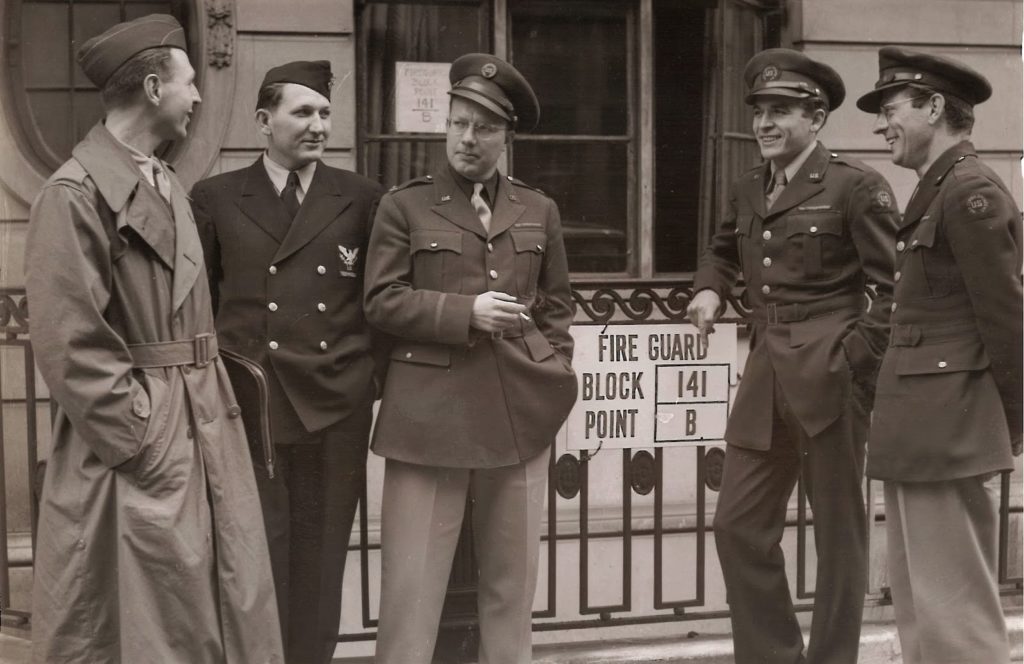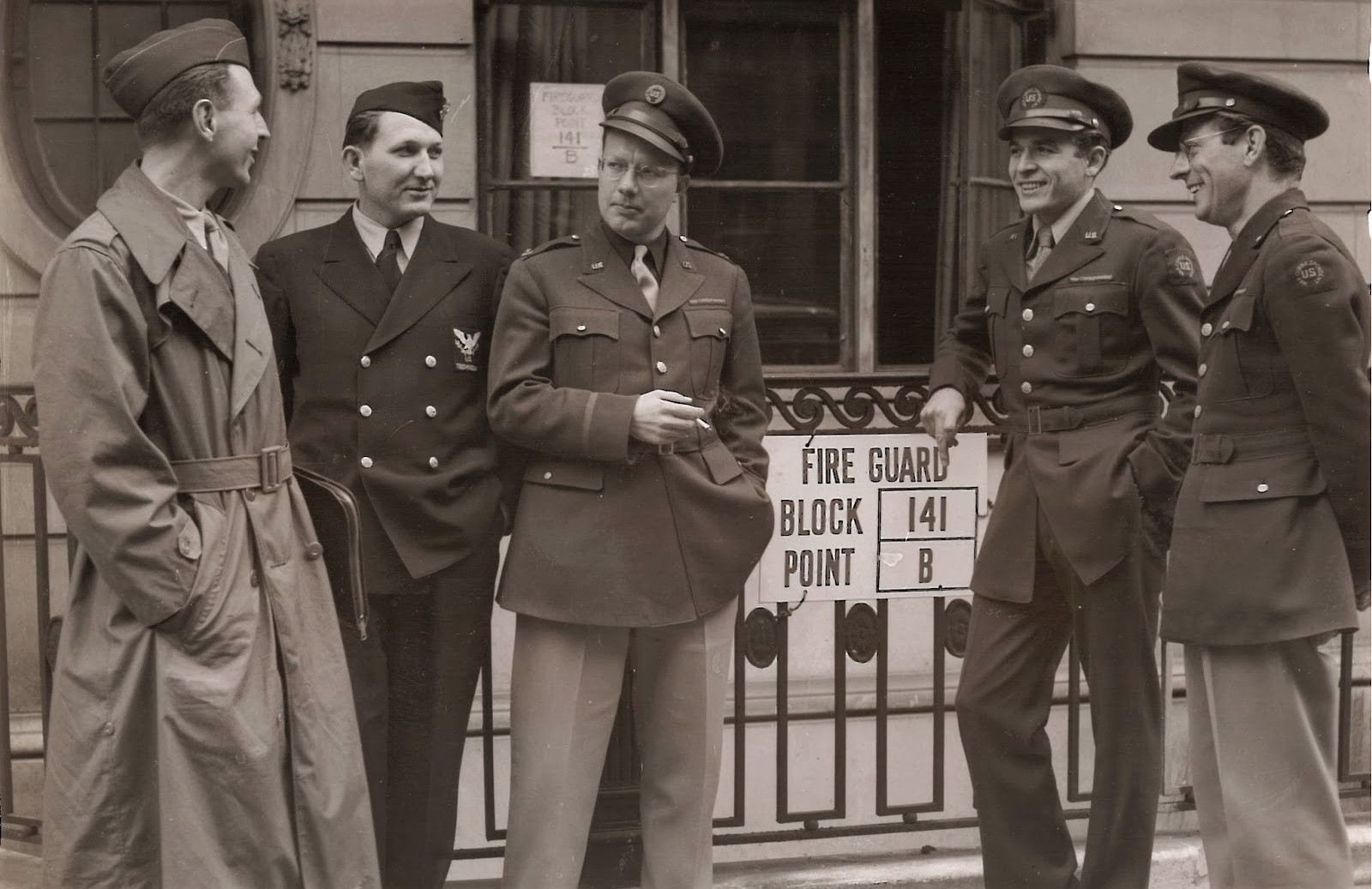
Charles Collingwood (second in from the right) with some of the Murrow Boys
Two months after the D-Day invasion by Allied forces, with the wind at their backs against German forces, CBS radio correspondent Charles Collingwood wrote an extraordinary story for radio broadcast:
“The French Second Armored Division entered Paris today after the Parisians had risen as one man to beat down the German troops who had garrisoned the city. It was the people of Paris,” Collingwood added, “who really won back their city… Every hand was raised against the enemy.”
As recorded in The Murrow Boys, by Stanley Cloud and Lynne Olson, Collingwood, recorded the story on his tape recorder, then slipped recording and script into a military press pouch for London.”
When the pouch arrived in the CBS offices in London, “someone read Collingwood’s report to a London-based military censor and dispatched a backup copy to the censors’ office.”
At the time, all news reports had to be cleared by military censors.
“Then, in what Allied headquarters later called a ‘pure but serious’ error, the censors – apparently (and erroneously) assuming that the story was true and that their counterparts in France had already passed it – approved it for transmission.”
The confusion began with reporter Collingwood who was in a race to beat fellow Murrow colleague Larry LeSueur to the story.
“Informed by General Bradley of the decision to move on Paris,” Cloud and Olson write, “[Collingwood] vowed he would be first with the story. But first he had to figure out a way to bypass the always uncertain broadcasting facilities. He hit upon an ingenious, if thoroughly unethical, solution. He would see to it that his story was ready and waiting in London when the liberation occurred.”
“Dick Hottelet was on duty in the CBS London office when Collingwood’s copy was handed to him. As he started to read it, he thought, My God, Paris has been liberated! Charlie’s there and he’s broken the story!” …
“…the BBC had interrupted… ‘Paris has been liberated. I repeat, Paris has been liberated!’
“America, and much of the rest of the world, went wild. …
“In Paris, where ten thousand German troops were still engaged in bloody combat… Collingwood’s story and the BBC’s bulletin were greeted with astonishment. …
“Fellow CBS correspondent Larry LeSueur was quick to debunk his colleague’s putative scoop [reporting] ‘Paris has not yet been entered by Allied troops…’
“It was a fiasco, the mother of all mistakes, and few, if any, of Collingwood’s colleagues were appeased by the explanation that he, CBS, the military, and the BBC offered.
“Collingwood’s unlikely account was that he had been told by army press officers that his story would not be released by censors in London until Paris was actually liberated. Any material that proved erroneous would be deleted at that time. But neither the script nor the recording carried a ‘hold-for-censorship’ message, and the censors – unaccustomed as they were to editing fabricated news stories – failed to check the facts.”
Last Friday (Dec. 8) CNN “corrected an exclusive report that said candidate Donald Trump and his son Donald Trump Jr. had received an email providing a web address and decryption key allowing them to access hacked documents from WikiLeaks before such documents were publicly available.
“When first published Friday morning,” CNN reports, “the story, written by senior congressional correspondent Manu Raju and politics reporter Jeremy Herb, said the email was sent to the Trumps on September 4, 2016. It was corrected to say that the email was actually sent on September 14, one day after WikiLeaks made the documents public.
“CNN’s initial reporting of the date on an email sent to members of the Trump campaign about Wikileaks documents, which was confirmed by two sources to CNN, was incorrect,” CNN said in a statement. ‘We have updated our story to include the correct date, and present the proper context for the timing of email.’
“Before the correction, the story,” CNN continues, “which relied on multiple sources who described the email to CNN — had been heavily promoted by the network. CNN devoted multiple segments to discussing it on air. It was also the lead story on its homepage for much of Friday morning and into the afternoon. During that time, CBS News also reported that it had matched CNN’s initial reporting.
“But at 1 p.m. ET, the story unraveled. The Washington Post obtained a copy of the email in question, which CNN did not have, and reported it was sent on the afternoon of September 14 — 10 days after CNN had reported it was sent. The Wall Street Journal quickly matched The Post’s reporting and The Daily Caller posted a copy of the email.”
The New York Times reported CNN’s error (Dec. 8), adding, “ ‘Between this and Brian Ross’ Flynn mistake, the mainstream media is doing a great job of bolstering Trump’s claims about fake news,’ wrote James Surowiecki, a former columnist for The New Yorker. ‘It’s the most obvious thing to say, but reporters need to SLOW DOWN. Being right is more important than being first.’ ”
“Journalists,” ethicist Michael Josephson writes, “must inspire credibility – faith and confidence in the honesty, accuracy and fairness of the information they convey.” And, he adds, “when in error, they should make full, fair, prominent and prompt corrections.”
While CNN did make a correction within hours of learning their error, clearly, the critical lesson to be learned from all this is that all media need to be more vigilant, understanding that it is more important to be right that first.
Comments











